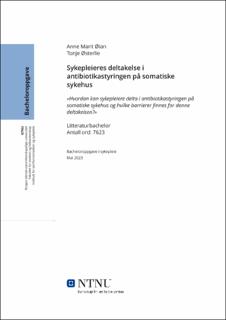| dc.contributor.advisor | Rangøy, Knut Arne | |
| dc.contributor.author | Øian, Anne Marit | |
| dc.contributor.author | Østerlie, Tonje | |
| dc.date.accessioned | 2023-08-20T17:19:15Z | |
| dc.date.available | 2023-08-20T17:19:15Z | |
| dc.date.issued | 2023 | |
| dc.identifier | no.ntnu:inspera:146721298:147643921 | |
| dc.identifier.uri | https://hdl.handle.net/11250/3084919 | |
| dc.description.abstract | Bakgrunn: I dag regnes antibiotikaresistens som en av de største truslene mot global helse. Fra 2000 til 2015 økte verdens antibiotikabruk med 65 %. Overforbruk og feil bruk bidrar til utvikling av bakterier som er resistente mot antibiotika. Sykepleiere har en sentral rolle i administrering av antibiotika på sykehus og observerer pasientenes kliniske tilstand hele døgnet. Sykepleiere er derfor i en god posisjon til å kunne bidra i antibiotikastyringen og forebygging av antibiotikaresistens.
Hensikt: Hensikten er å undersøke hvilken rolle sykepleiere har i antibiotikastyringen på somatiske sykehus, og belyse hvilke barrierer og muligheter som finnes for deres deltakelse til god antibiotikastyring.
Metode: Et systematisk litteraturstudium gjennomført mellom mars 2023 og mai 2023 basert på åtte forskningsartikler. Det ble gjennomført systematiske søk, utvelgelse av artikler og analyse av disse.
Resultat: Funn i studiene viser at sykepleiere er i en ideell posisjon for å delta i antibiotikastyringen på sykehus. Samtidig oppgir de at udefinerte roller, negativ sykehuskultur, tidspress og manglende kunnskap om mikrobiologi, antibiotika og antibiotikaresistens, er faktorer som gjør denne deltakelsen utfordrende.
Konklusjon: En klart definert rolle og kompetanseheving er tiltak som kan øke sykepleiers deltakelse i antibiotikastyringen. Gjennom observasjoner, god etterlevelse av prosedyrer og informasjon og opplæring av pasient og pårørende, kan sykepleier delta i kampen mot antibiotikaresistens. | |
| dc.description.abstract | Background: Today, antibiotic resistance is considered one of the biggest threats to global health. From 2000 to 2015, the world's antibiotic use increased by 65%. Overconsumption and incorrect use contribute to the development of bacteria that are resistant to antibiotics. Nurses have a central role in the administration of antibiotics in hospitals as well as observe the patient's clinical condition around the clock. Nurses are therefore in a good position to contribute to antibiotic management and the prevention of antibiotic resistance.
Aim: The purpose is to investigate the role nurses have in antibiotic stewardship in hospitals, and to shed light on what barriers and opportunities that exist for their participation in good antibiotic stew.
Method: A systematic literature study conducted between March 2023 and May 2023 based on eight research articles. Systematic searches, selection of articles and analysis of these were carried out.
Results: Findings in the studies show that nurses are in an ideal position to participate in antibiotic stewardship in hospitals. At the same time, they state that undefined roles, negative hospital culture, time pressure and a lack of knowledge about microbiology, antibiotics and antibiotic resistance are factors that make this participation challenging.
Conclusion: A clearly defined role and skills development are measures that can increase nurses' participation in antibiotic stewardship. Through observations, good compliance with procedures and information and training of patients and relatives, nurses can participate in the fight against antibiotic resistance. | |
| dc.language | nob | |
| dc.publisher | NTNU | |
| dc.title | Sykepleieres deltakelse i antibiotikastyringen på somatiske sykehus | |
| dc.type | Bachelor thesis | |
